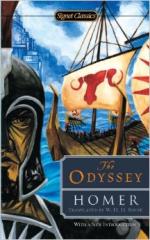|
|
The Odyssey Objects/Places
Suitors: Princes and nobles from Ithaca and the surrounding islands who take up residence in the house of Odysseus waiting for Penelope to choose a new husband. This is so important to them because whoever marries her becomes king by transfer of her power.
Mt. Olympus (Mt. Olympos): Mythical home of the gods. A mountain in Greece where the Greeks believed the gods made their home.
Ithaca (Ithaka): Odysseus' home island over which he rules as king. It was located on the western side of mainland Greece.
Unwoven Loom: Penelope's main device of deceit for the suitors, she promised them she would choose a new husband after she was done weaving a death shroud for Odysseus. She would weave all day and then at night, after the suitors left, she would unweave her work. This lasted four years before the suitors figured it out.
Pylos: City on mainland Greece over which Nestor rules.
Sparta (Laikedaimon): City over which Menelaus rules. Telemachus goes here in search of his father.
Crete (Krete): Legendary home of King Minos, the labyrinth and the Minotaur. This is the island Odysseus keeps claiming he is from when he lies to his family and the swineherd.
Skheria: Island of the Phaiakians where Odysseus tells his long story and secures passage back to Ithaca after so many years.
Lamnos: Nightless island where some of Odysseus' men were eaten by giants.
Cattle of the Sun: Holy cattle of a special breed possessed by the lord of the sun. Odysseus is warned to make sure that his men do not steal these cattle but his efforts are futile.
Sirens (Seirenes): Singing women-like beasts who inhabit an island and guide sailors to their deaths with their beautiful songs. Odysseus has himself tied to the mast of the ship so he can listen to their song.
Scylla: Six-headed beast who inhabits the cave parallel to the whirlpool Charybdis. Scylla eats six of Odysseus' men.
Charybdis (Kharybdis): A whirlpool that erupts three times a day sucking anything near it down into its depths and then vomiting it back up.
Odysseus' bow: Odysseus' bow was given to him by a man named Iphitos to make up for sheep that were stolen from Ithaca. It is very large and difficult to handle and only Odysseus can string it. When Penelope wants to test the suitors and delay them further she tells them that whoever strings the bow and shoots it through twelve axeheads may marry her. Telemachus almost strings it but stops with a look from his disguised father. None of the suitors can string it.
Olive Bed: A beautiful bed made from the trunk of an olive tree by Odysseus before he went to Troy. He planed it, sanded it, adorned it, and made a pact with Penelope that no man would ever see that bed but he. This bed is how Penelope knows that Odysseus has really come home to her.




